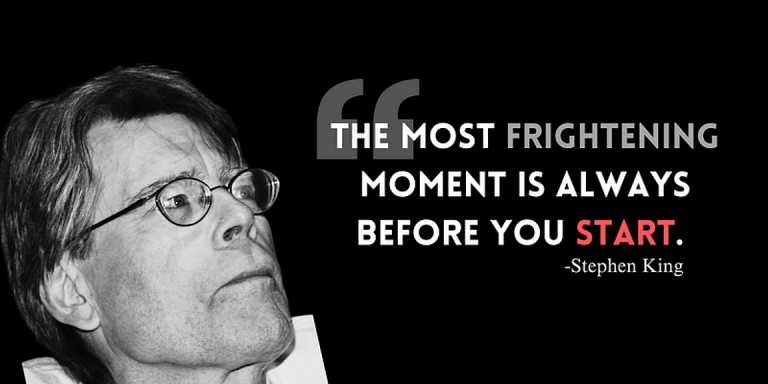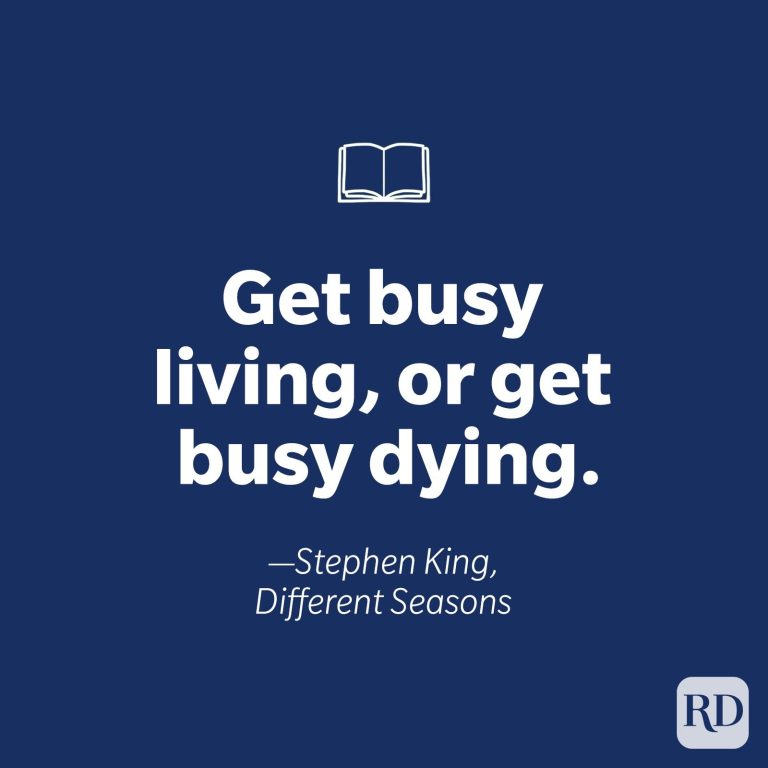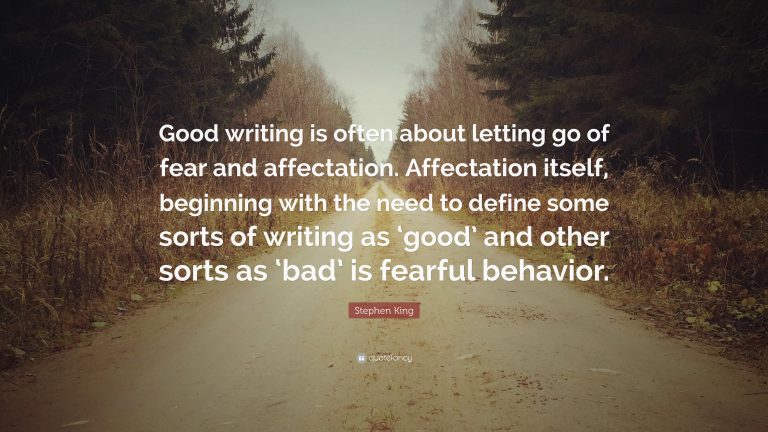Which Stephen King Quotes Are Perfect For Understanding Foreshadowing?
Are you a fan of Stephen King’s suspenseful and thrilling novels? Looking to delve deeper into the art of foreshadowing within his works? Well, you’re in luck! In this article, we will explore some of the most captivating quotes from Stephen King that perfectly exemplify the use of foreshadowing. These quotes not only provide insight into the intricacies of his storytelling, but also serve as valuable lessons in the craft of writing.
Stephen King is a master at building suspense and keeping readers on the edge of their seats. His ability to foreshadow events within his narratives is simply unparalleled. By incorporating foreshadowing, he expertly hints at future plot developments, creating an air of anticipation and intrigue. In this article, we will analyze some of his most powerful quotes, dissecting their underlying meaning and exploring how they contribute to the overall narrative structure. So, buckle up and get ready for an exhilarating journey through the world of Stephen King’s foreshadowing prowess!
1. “The man in black fled across the desert, and the gunslinger followed” – from The Gunslinger. This quote hints at an epic chase and sets the tone for the entire Dark Tower series.
2. “All roads lead to the Tower” – from The Dark Tower. This quote suggests that the journey will lead to a central point, building anticipation for what lies ahead.
3. “Redrum” – from The Shining. This iconic quote, when spelled backward, reveals a chilling foreshadowing of the protagonist’s descent into madness.
Stephen King’s masterful use of foreshadowing adds depth and suspense to his stories, making them truly unforgettable.

Understanding Foreshadowing: Exploring Stephen King Quotes
Foreshadowing is a powerful literary device that allows authors to hint at future events in their stories. One author who excels at using foreshadowing to build suspense and anticipation is Stephen King. His novels and short stories are filled with quotes that offer glimpses into the dark and mysterious paths his narratives will take. In this article, we will dive into the world of Stephen King and explore which of his quotes are perfect for understanding foreshadowing.
The Art of Foreshadowing in Stephen King’s Works
Stephen King is hailed as the “Master of Horror” for a reason. His ability to create a sense of foreboding and tension is unparalleled. Through his carefully crafted quotes, King plants the seeds of future events, leaving readers on edge and hungry for more. Let’s take a closer look at some of his most notable quotes that showcase his mastery of foreshadowing.
One such quote can be found in King’s iconic novel, “The Shining”: “All work and no play makes Jack a dull boy.” At first glance, this quote may seem innocuous, but as the story unfolds, it becomes a chilling reminder of the descent into madness that awaits the protagonist. It foreshadows the isolation, psychological torment, and eventual violence that will consume Jack Torrance.
Another quote that showcases King’s skill in foreshadowing comes from his novel “Carrie”: “They’re all gonna laugh at you.” This quote, repeated several times throughout the story, hints at the humiliation and torment Carrie White will endure at the hands of her classmates. It foreshadows the devastating consequences of bullying and sets the stage for the catastrophic climax of the novel.
The Impact of Foreshadowing in Stephen King’s Narratives
Foreshadowing serves several crucial purposes in Stephen King’s narratives. Firstly, it builds suspense and tension, keeping readers engaged and eagerly turning the pages. By hinting at future events, King creates a sense of anticipation, making readers desperate to discover how things will unfold.
Additionally, foreshadowing adds depth and complexity to King’s characters and their motivations. Through carefully placed quotes, King provides insight into their inner turmoil and the choices they will make. This enables readers to better understand and empathize with the characters, even if their actions are morally ambiguous.
Foreshadowing also enhances the overall atmosphere of King’s stories. By hinting at dark and ominous events, King creates an unsettling sense of unease that permeates every page. This atmospheric foreshadowing sets the stage for the horrifying and macabre elements that are a trademark of King’s writing.
In conclusion, Stephen King’s quotes are a treasure trove for understanding the art of foreshadowing. By examining these quotes, readers can gain insights into the complex web of suspense and anticipation that King weaves in his narratives. Whether it’s through a seemingly innocent line or a repeated mantra, King’s foreshadowing keeps readers on edge and ensures that his stories linger in their minds long after the final page is turned. So, dive into the world of Stephen King’s quotes and unravel the secrets of foreshadowing for yourself.
Key Takeaways: Which Stephen King quotes are perfect for understanding foreshadowing?
- Stephen King’s quote, “The trust of the innocent is the liar’s most useful tool,” highlights how foreshadowing can involve deception and betrayal.
- In his book “The Shining,” King writes, “Monsters are real, and ghosts are real too. They live inside us, and sometimes, they win.” This quote suggests that the supernatural can have a significant impact on the development of a story.
- “Sooner or later, everything old is new again,” as King states in his novel “The Colorado Kid,” demonstrates how foreshadowing can involve the recurrence of past events or themes in a new context.
- King’s quote from “Carrie,” “The idea that creative endeavor and mind-altering substances are entwined is one of the great pop-intellectual myths of our time,” hints at the potential consequences and dangers associated with pursuing artistic or imaginative endeavors.
- “Remember, Hope is a good thing, maybe the best of things, and no good thing ever dies,” a line from “The Shawshank Redemption,” suggests that hope can be a powerful force that drives the narrative and influences the outcome of a story.
Frequently Asked Questions
Q: How does Stephen King use foreshadowing in his writing?
Stephen King is a master of foreshadowing in his writing. He often plants subtle hints and clues throughout his stories that hint at future events. These hints can be in the form of symbolic imagery, recurring themes, or even specific phrases or actions by the characters. By using foreshadowing, King creates a sense of anticipation and suspense, keeping readers on the edge of their seats.
One example of foreshadowing in Stephen King’s writing is in his novel “The Shining.” Early in the story, the character of Danny Torrance has a vision of blood pouring out of an elevator. This image acts as a foreshadowing of the violence and horror that will unfold later in the book. By including this subtle hint, King prepares the reader for the terrifying events to come.
Q: Which Stephen King quotes illustrate foreshadowing in his works?
Stephen King has written many memorable quotes that demonstrate his skill in using foreshadowing. One such quote is from his novel “IT,” where he writes, “They float, Georgie, and when you’re down here with me, you’ll float too.” This quote hints at the supernatural and otherworldly nature of the story, foreshadowing the horrors that the characters will face.
Another example of a Stephen King quote that showcases foreshadowing is from his book “Pet Sematary.” He writes, “Sometimes, dead is better.” This quote alludes to the dangers and consequences of meddling with death, setting the stage for the dark and haunting events that unfold in the story.
Q: How does foreshadowing enhance the reading experience in Stephen King’s stories?
Foreshadowing plays a crucial role in enhancing the reading experience in Stephen King’s stories. It adds depth and complexity to the narrative, allowing readers to anticipate and speculate about future events. Foreshadowing creates a sense of unease and tension, keeping readers engaged and invested in the story.
By incorporating foreshadowing, Stephen King builds suspense and anticipation, making the eventual payoff even more satisfying. It also adds an element of realism to the story, as foreshadowing mirrors the way events unfold in real life. Overall, foreshadowing enriches the reading experience by immersing readers in a world filled with mystery and intrigue.
Q: Are there any specific Stephen King novels that are known for their effective use of foreshadowing?
Several Stephen King novels are renowned for their masterful use of foreshadowing. One such novel is “The Stand,” where King weaves a complex tapestry of foreshadowing throughout the story. Symbolic imagery, recurring motifs, and subtle hints all come together to create a sense of impending doom and ultimate redemption.
Another notable example is “Misery,” a psychological thriller that showcases King’s ability to foreshadow the psychological torment that the protagonist will endure. Through carefully crafted dialogue and subtle clues, King builds tension and foreboding, leading to a shocking climax.
Q: How can readers analyze Stephen King quotes to understand foreshadowing?
When analyzing Stephen King quotes to understand foreshadowing, readers should pay attention to recurring themes, symbols, and motifs. Look for patterns and connections between seemingly unrelated events or characters. Additionally, examine the context in which the quote is presented and consider how it relates to the overall narrative.
It is also helpful to consider the tone and atmosphere created by the quote. Does it evoke a sense of foreboding or anticipation? Does it hint at future events or reveal hidden meanings? By carefully examining Stephen King’s quotes in this way, readers can gain a deeper understanding of the foreshadowing techniques he employs in his writing.
Top 10 Uses of Foreshadowing in Disney Movies
Final Summary: Unveiling the Power of Stephen King Quotes in Understanding Foreshadowing
In the world of literature, foreshadowing is a powerful technique that adds depth and anticipation to a story. And who better to learn from than the master of suspense himself, Stephen King? Throughout his vast collection of works, King has provided us with numerous quotes that perfectly capture the essence of foreshadowing. From the chilling to the thought-provoking, these quotes offer valuable insights into the art of hinting at future events. Let’s take a moment to delve into some of these quotes and unravel the secrets of foreshadowing.
One of Stephen King’s most iconic quotes on foreshadowing comes from his novel, “The Shining”: “Sometimes human places, create inhuman monsters.” This quote serves as a subtle warning, hinting at the sinister forces lurking within the seemingly ordinary Overlook Hotel. It sets the stage for the horrors that await the characters, creating an air of unease and anticipation. King’s ability to use concise and evocative language in his quotes is a testament to his mastery of foreshadowing.
Another memorable quote comes from “Carrie,” where King writes, “They’re all gonna laugh at you!” This quote not only foreshadows the humiliation and torment that the titular character, Carrie, will endure but also hints at the disastrous consequences that will follow. It captures the essence of foreshadowing by creating a sense of impending doom and inevitability. It’s a reminder that even the seemingly insignificant details can hold immense weight in a story.
In conclusion, Stephen King’s quotes are a treasure trove for understanding foreshadowing. They offer glimpses into the dark corners of the human psyche and set the stage for the twists and turns that lie ahead. By studying these quotes and analyzing their underlying meanings, readers can enhance their understanding of foreshadowing and apply it to their own writing. So, let King’s words guide you as you navigate the intricate world of foreshadowing, and let the power of anticipation captivate your readers.






